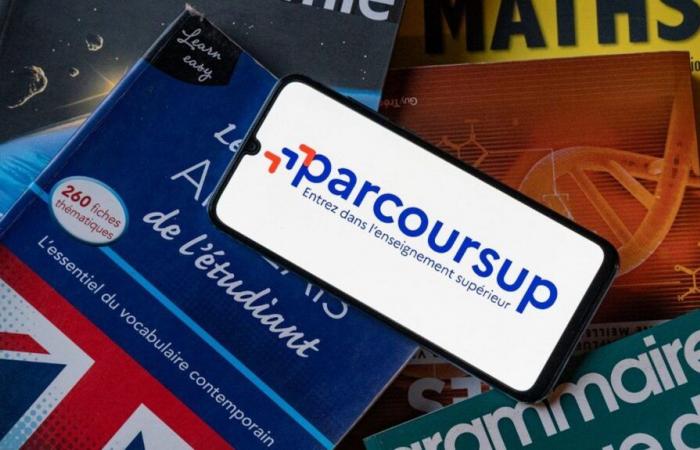Future students find the new tools offered by the platform useful, even if they can be a source of disappointment. On the side of the unions, there is fear that they will lead to more self-censorship.
Is transparency at all costs necessary to help high school students make a choice for the future? The new features offered by Parcoursup raise this question. While candidates can express their wishes from Wednesday January 15 until March 13, they have had the opportunity, since December 18, to estimate their real chances of being selected. To do this, they simply need to provide their final year general average and their chosen specialties for the baccalaureate. A simulator then delivers the sentence: over the last three years, depending on the profile of the high school student, the training sends “rarely”, “occasionally”, “regularly”, “more than 50%” or “more than 80%” an admission proposal. Candidates also have access to the “profile” of the most commonly admitted high school students (general average and most common specialties) and the access rate according to their sector.
Objective stated by the Ministry of Higher Education: strengthen the clarity of the admission process and help “the candidates in their reflection on the choice of wishes”. But how are these developments received by those primarily concerned?
Nolan, a high school student in Cher, sums up his feelings this way: “This data is rather a good thing, but it is also double-edged. It can reassure us as well as break our morale.” According to him, “not knowing too much” your chances of being admitted is ultimately about allowing yourself to believe in them. For Sciences Po Paris, which he wishes to join, the platform tells him that his profile is “occasionally” or “more than 50%” accepted, if we include the regional campuses of the famous Parisian school. In history or art history, his other aspirations, he “more than 80%” chances of being admitted.
“At least we know what to expect.”judge Aurore, high school student in Sceaux (Hauts-de-Seine). It aims for law degrees or double degrees in law and political science. With an average of 15 and a combination of specialties “Humanity, literature and philosophy” (HLP) and “History-geography, geopolitics and political sciences” (HGGSP), Aurore nevertheless says she “disgusted” of the report delivered by the Parcoursup simulator. His profile is indeed “rarely” accepted by most of the training courses that make her dream.
“I didn’t expect that, I thought my career would be more valued.”
Aurore, high school student in Sceaux (92)at franceinfo
For her part, Camille has the ambition to study medicine, in Pass (the classic course) or in LAS (a classic degree with a minor focused on health). Either in Reims, the metropolis closest to her home, or in Paris. “Because I’m in a technology baccalaureate, it’s not easy,” reports this high school student. Even before knowing his average and his specialties, Parcoursup reveals the access rate for his sector. Verdict for most Capital Pass formations: 0%, car “no candidate was able to receive a proposal”.
Unlike Aurore, Camille confides that she is “little surprised” by this observation. And welcome the change of Parcoursup. “They are good tools because they allow us to situate ourselves.”
While the platform is regularly criticized for its opacity, this year's new features respond to certain recommendations. In March 2024, the sixth annual report of the Parcoursup Ethical and Scientific Committee notably proposed“move towards more transparency in the quantitative criteria used for the pre-classification of candidates, including taking into account specialties”. Annabelle Allouch, lecturer in sociology at the University of Picardie Jules-Verne, and co-author of Challenge Parcoursup (Presses de Sciences Po), salutes a “laudable desire for transparency as it stands”, but emphasizes that the basic problems have not been resolved.
“Transparency does not mean that the information will be more understandable for all students. It does not assume that these candidates will read everything, nor that they will be able to prioritize the information given to them.”
Annabelle Allouch, co-author of the book “Contester Parcoursup”at franceinfo
“It is wrong to think that because candidates will have more information, they will be more rational in their choices. There will not be more social justice,” completes the sociologist.
Manès Nadel, president of the High School Union (USL), goes further. “The indicators by which the formations select are still not communicated” on Parcoursup, he laments. In June 2023, the fact-finding mission carried out by Senator LR Jacques Grosperrin already criticized the indecipherable nature of the classification methods used by the wishes examination commissions, at the discretion of each establishment. He wondered, for example, whether or not he would use “of a mathematical preclassification formula” and the “taking into account or not the original high school”.
On this subject, Mediapart presented a textbook case a year ago: the private Parisian high school Stanislas had encouraged some of its students to renounce their other wishes on the platform in exchange for the guarantee of being admitted to the one of its preparatory classes for the Grandes Ecoles (CPGE).
“This lack of transparency (…), coupled with great heterogeneity in ranking methods, arouses strong suspicion and does not allow candidates to properly estimate their chances,” outlines the senatorial report. Thus, according to Manès Nadel, “this year we are presenting as additional transparency tools which are not, and which will simply lead to more self-censorship”.
The influence of these new functionalities when entering wishes, more particularly that of the individual simulator, is a fear shared by Hania Hamidi, general secretary of the student union Unef. “The platform assesses the level of a high school student who is not even 18 years old. It’s demoralizing. It’s a completely institutionalized self-censorship and social preselection machine”she denounces in the columns of Humanity. According to her, the message sent is the following : “Don’t go to this training, because it’s not for you.”
“This goes against the freedom of being able to study in the field of one’s choice.”
Hania Hamidi, general secretary of Unefat Humanity
Clearly, according to the USL and Unef, high school students must now choose their training based on their academic career and their results, rather than based on their real aspirations. The students interviewed by franceinfo nevertheless assure that they will not abandon their choice of heart. “In any case, it’s just an estimate. We can’t just rely on that to make a choice.”notes Nolan.
“It’s discouraging, but I’m not going to give up on my wishes. On the other hand, I’m thinking of reconsidering them, looking at what else can be done”explains Aurore, who is considering requesting less selective licenses. Célestine, a high school student in Courbevoie (Hauts-de-Seine), emphasizes that the simulator's sentence is not irrevocable. “It’s not going to determine my choices.”assures those who are interested in design and interior architecture. While the public training courses that attract him take “occasionally” profiles like hers, she plans to apply in parallel to private schools outside Parcoursup.
Regardless of the very reduced access rate for techno baccalaureates, Camille reports being all the more motivated to apply for medicine: “I’m going to give my all next term”she assures, with an average already hovering above 16. As for Clémentine, who follows her schooling remotely due to a school phobia, she wants to focus on sociology, a sector where “there is generally a 100% access rate” for ST2S baccalaureate students (health and social sciences and technologies) like her. This very positive observation allows him to soothe his anxieties and concentrate on the baccalaureate. She assures that she has enough confidence in the platform not to express wishes for help.
However, a risk exists for students whose files are judged “good” by Parcoursup before the entry of wishes, warns Manès Nadel. “Making candidates think that their place is guaranteed from the start is just as problematic, if they are ultimately not taken,” than provoking self-censorship, he judges. In general, the USL campaigns for the opening of new places at university and a platform that allows wishes to be prioritized. This was possible with APB, the ancestor of Parcoursup, even if this system also had its limits.






